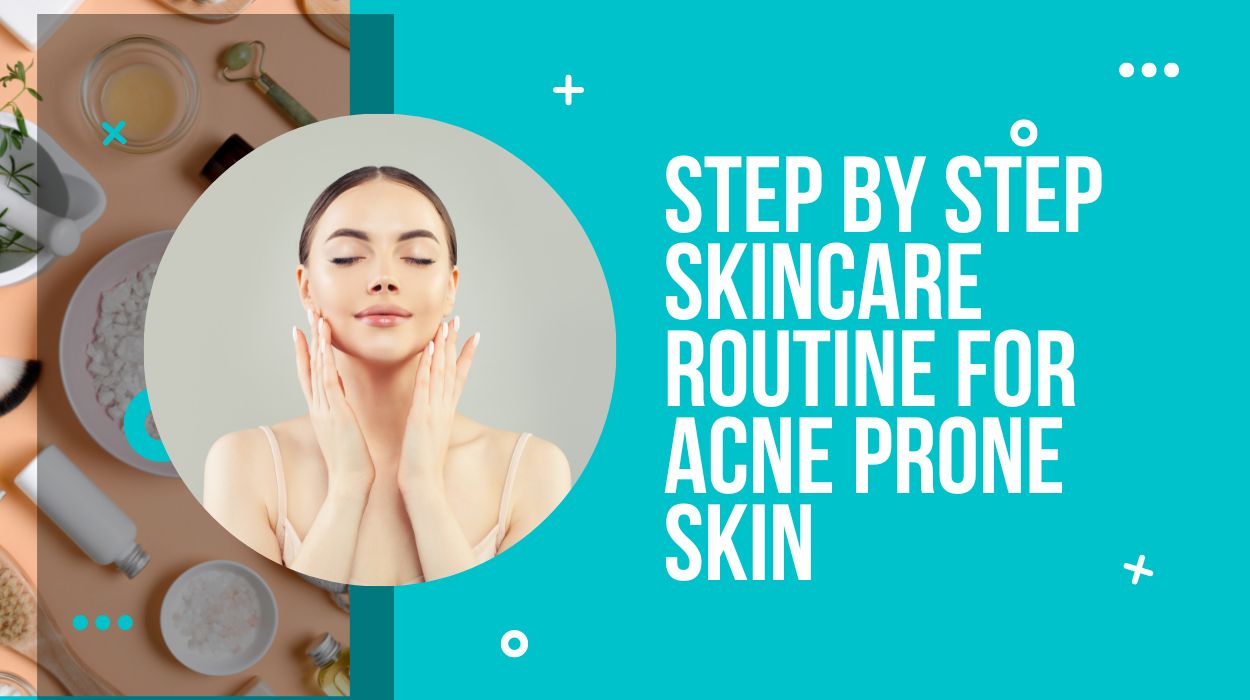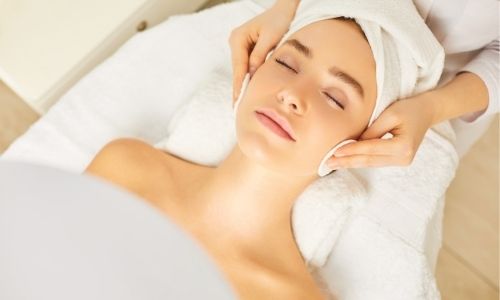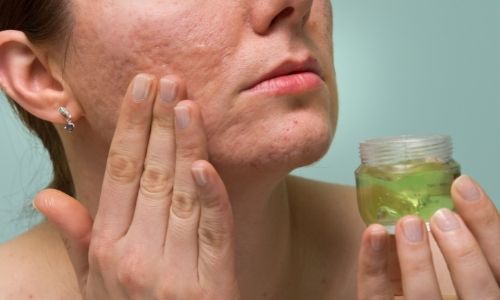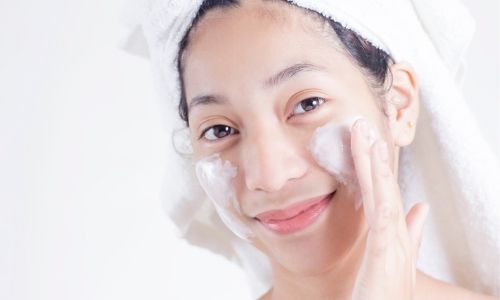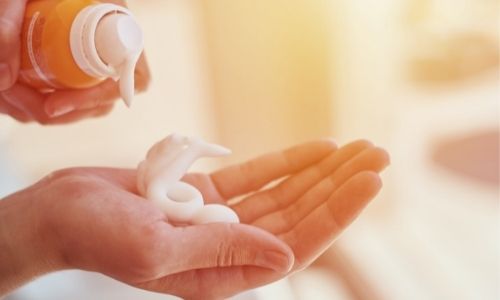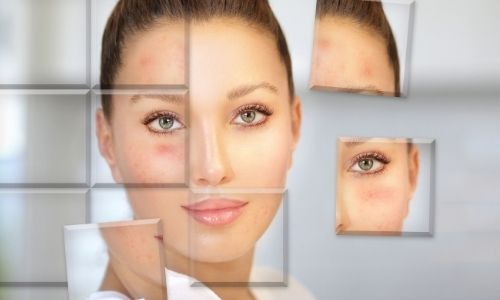Acne-prone skin is one of the most sensitive skin types. Taking extra care of acne-prone skin is essential to ensure that acne is not persistent and is dulling your look. Hence, planning a skincare routine for acne-prone skin becomes challenging.
Are you searching for the best skincare routine for your acne-prone skin? If yes, we got you. In this article, we will cover a step-by-step guide that you can follow for taking utmost care of your acne-prone skin.
Step 1: Cleanse
Cleansing is an essential step in any skincare routine. It eliminates dirt, oil, and impurities that may clog up pores and cause acne. It does not matter what skin type you have; cleansing regularly protects your skin from all kinds of damage.
Tips for Cleansing
- Cleansers are for clearing off the dirt, oil, and bacteria clogging your skin. Not using the right cleanser can mess up your acne more.
- Use a sulfate-free and oil-free cleanser only. Avoid cleansers containing hard exfoliants.
- If you are on acne medications, using a non-medicated cleanser is recommended.
- If you aren’t on any acne medications, you can use salicylic acid or benzoyl peroxide cleansers. Salicylic acid can be preferred if you have whiteheads or blackheads. Benzoyl peroxide can be preferred if you have red and inflammatory acne.
- Do not use harsh soaps on your skin as they may aggravate the acne.
- A gentle foaming cleanser will help to cleanse your skin.
- Cleansing once or twice a day is recommended. Do not over-cleanse. It might irritate your skin and cause inflammation of the acne.
- Do not cleanse with washcloths, sponges, or any other rough material. Cleansing brushes should also not be used on acne-prone skin. Use your fingertips to massage the cleanser gently on your face.
- Do not use hot water to rinse your face or wash off the cleanser. Mild or lukewarm water is recommended for cleansing acne-prone skin.
How To Use/Apply Cleanser?
- Use lukewarm water to wash and rinse your face.
- Apply the cleanser gently with your fingertips. Massage the cleanser, do not scrub it.
- Rinse again with lukewarm water and pat it dry with a soft towel.
Author’s tip: Massage the cleanser on your face gently for 30-60 seconds. Do not keep it on for a longer duration, as it might dry out the skin completely.
Step 2: Tone
Toners or astringents help remove excess oil and hydrate the skin. It also helps fight blackheads and blemishes while balancing the skin’s pH. Toners are an optional step and are okay if not done regularly.
Tips for Toning
-
- If you have oily acne-prone skin, use astringents. If you have dry acne-prone skin, using hydrating toners is recommended.
- Alcohol-free toners are the best option available. Alcohol-based toners are drying and irritating. Nonetheless, they can sting open pimples too.
- Ensure that astringents do not irritate your skin or dry them too much. In case it happens, your acne might aggravate.
- Toners containing salicylic acid or benzoyl peroxide usually work the best for acne-prone skin.
- Toners with glycolic acid may help fade dark acne marks.
How to Apply Toner?
- Take a cotton ball or a smooth pad.
- Apply some toner to the cotton ball.
- Gently rub the cotton ball of toner over your skin.
Author’s tip: Apply moisturizer or sunscreen after your toner dries out completely. Generally, toner might take a minute or two to dry out completely.
Step 3: Apply Medications for Your Acne
Applying medications for your acne can prevent acne breakout and give you clear, flawless skin. You can take acne medications from a local pharmacy. However, visiting a dermatologist is recommended, as different acne types require different treatments. Here’s a list of the most commonly prescribed treatments depending on the type of acne.
Most Commonly Recommended Treatments.
The following treatments have been recommended by the American Academy of Dermatology (AAD).
- If you have blackheads and whiteheads, commonly known as Comedonal Acne, you should use products containing retinoids like adapalene gel. According to a study published in the American Journal of Clinical Dermatology, topical retinoids are safe and efficacious for acne-prone skin. The study also highlighted that when retinoids are combined with benzoyl peroxide, they prove to be more effective.
- If you have mild acne, benzoyl peroxide, with or without retinoids, can be a great companion.
- For people with inflammatory acne, dapsone 5 percent gel topical is commonly recommended.
- If your acne comes with scarring, Azelaic acid might help.
Acne medications work significantly to reduce acne. However, staying adherent to acne medications can be challenging. Set reminders on your phone to ensure that you never miss medications!
Step 4: Moisturize
Moisturizers are essential to keep your skin hydrated at all times. Even if your skin type is oily, your skin doesn’t need to be getting adequate hydration. Nonetheless, acne medications may dry out your skin, making it thirsty for hydration.
Hence, moisturizing is a critical element of the skincare routine for oily, dry skin. Lightweight moisturizers are the best for oily, acne-prone skin. Nonetheless, ensure that your moisturizer contains non-comedogenic ingredients only. Using a non-oily moisturizer containing hyaluronic acid is recommended.
Step 5: Apply Sunscreen
Sunscreen protects your skin from sun damage. Nonetheless, most acne medications have been observed to make your skin prone to skin damage. Applying sunscreen every day for all skin types is necessary.
According to a study published in the American Journal of Clinical Dermatology, moisturizing sunscreens or sunscreen with a liquid base are appropriate for young, oily, acne-prone skin. Hence, if your moisturizer contains SPF or vice versa, you can skip using one of the two products.
Step 6: Night Skincare Routine
Following a good night, a skincare routine is essential for acne-prone skin. A night skincare routine is essential to clear your skin’s dust, debris, and makeup. A night skincare routine is a combination of the first 3 steps. These include,
Cleanse
Cleanse your face to remove all the dust, makeup, and bacteria that have settled in the entire day on your skin. Cleansers as a night skincare routine are important, especially for those with oily skin. The best thing about a cleanser is that it does not tip off the natural oils from the skin.
Toner
Toners are an optional step in the skincare routine. However, they prove to be highly beneficial. Toning helps your skin fight blemishes and remove excess oil while hydrating the skin. Nonetheless, toners help balance the pH of the skin hence controlling acne and dry skin.
Moisturize
Moisturizing is essential to keep your skin hydrated throughout the night. Nonetheless, ensure that your nighttime moisturizer does not contain SPF, as overuse of SPF in acne-prone skin leads to clogged pores. You can replace your moisturizer with night creams too.
You can start your night skincare routine with a makeup remover if you have applied makeup. You can also apply spot treatments at night for blemishing your acne.
Following a step-by-step skincare routine will show you great results within a few weeks. However, a skincare regimen alone cannot ensure a break from acne. Keep reading to find out a few additional tips for acne-prone skin.
Additional Tips for Acne-Prone Skin
Maintaining a skincare routine alone won’t benefit you. You need to take additional precautions to ensure that your acne is at bay. Here is a list of a few tips to try to protect your skin from acne.
- Exfoliate your skin regularly. If you are using a physical exfoliator, do it 3-4 times a week. If you are using a chemical exfoliator like a mask, do it once or twice a week.
- Get adequate sleep.
- Choose your makeup wisely. Ensure that your makeup is oil-free and non-comedogenic.
- Do not pick or pop the zits on your skin.
- Stress has also been associated with causing acne. Hence, find ways to de-stress to avoid acne breakouts.
- Quit smoking to quit acne.
- Eat healthily. Consume fresh fruits, vegetables, and whole grains.
- Drink plenty of water.
Author’s note: Remember that no acne routine or medication will work overnight. You will have to be patient and consistent with your routine.
Frequently Asked Questions
What Should You Not Use for Acne-Prone Skin?
Having acne-prone skin means taking extra care of your skin and pampering it. With acne-prone skin, you need to ensure that no irritants come in contact with your skin and inflame or outburst your acne. A few of the products you should avoid on your acne-prone skin include coconut oil, lanolin, algae extract, Isopropyl myristate/Isopropyl palmitate, and parabens.
Is Rose Water Good for Acne-Prone Skin?
Rose Water is anti-inflammatory. It reduces the redness and swelling of acne, thus soothing the discomfort caused due to acne. Nonetheless, rose water is a powerful antioxidant, too, thus preventing acne caused by oxidative damage of free radicals.
Should I Exfoliate If I have acne?
Regular exfoliation smoothes and softens the skin while brightening your complexion. However, physical exfoliators might be wrong if you have inflammatory acne or acne caused by bacteria. Hence, before using any exfoliator, read its contents or contact your physician to avoid harming your skin.
10 Best Moisturizing Face Creams For Acne-Prone Skin
10 Best Face Wash For Pimples In India
Best Salicylic Acid Serum In India
Conclusion
Genetics and hormones aren’t the sole reason that might cause acne. Several environmental and lifestyle factors also play an essential role in developing acne. However, following a good skincare routine ensures that your skin is flawless and doesn’t get prone to acne.
Cleansing, toning, moisturizing, taking your acne medications on time, applying sunscreen, and having a good nighttime skincare routine are the best ways to take care of acne-prone skin and protect it from any kind of scarring and damage.
Drop in a comment below and tell us what your skincare routine looks like!

